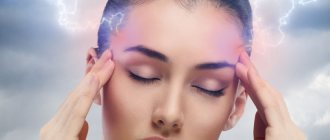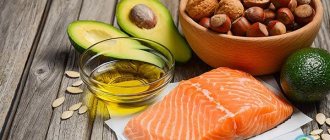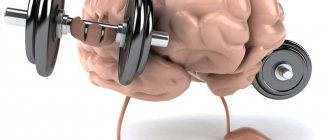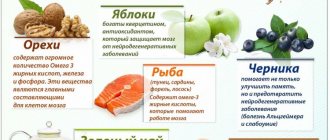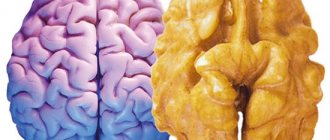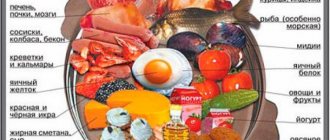Not feeling the joy of life or being in a state of anxiety, we often grab food - but, as it turns out, it’s not at all what we need! We'll tell you how you can use nutrition to correct symptoms of depression and headaches.
Let's start with some scary numbers. Today, depression is the world leader in the number of mental disorders. According to WHO estimates, more than 300 million people from all age groups suffer from it, including 8 million Russians. And every year this disease leads to 800 thousand suicides in the world - for people 15-29 years old it is the second leading cause of death.
Women are more susceptible to depression than men, due to greater susceptibility due to hormonal, genetic or other characteristics of brain development and functioning.
With age, the likelihood of depressive disorders only increases. If in developed countries every second such patient receives help, then in the rest of the world - at best, every tenth. And not only does the patient suffer from depression, his family suffers, which cannot live fully, society suffers, in whose life the person no longer takes an active part, and the economy bears the costs.
For every third patient with depression, traditional drug therapy does not help. In general, the world community is sounding the alarm, and I completely agree that depression is one of the threats to human health, along with obesity.
How stress leads to depression
According to experts, in general, depression is observed in 20-30 percent of people who seek medical help for a completely different reason. Rarely does a person come straight to a psychotherapist; rather, he will turn, for example, to a gastroenterologist or cardiologist. Our body is a single system, and there is no denying the fact that there is a clear relationship between depression and physical health.
For example, cardiovascular diseases and gastrointestinal pathologies can lead to the development of depression, and vice versa. And, of course, one of the significant factors in the formation of this condition is stress.
As soon as a stressful event occurs (or simply daily stress accumulates to a certain level), our sympathetic nervous system (this is part of the autonomic nervous system) and the hypothalamic-pituitary-adrenal system (hypothalamic-pituitary-adrenal axis, HPA) are immediately activated. on which the production of most important hormones depends. Within a few hours after this, cortisol and adrenaline are released, which have a significant effect on the physiological activity of the gastrointestinal tract, reduce the motility of the stomach and small intestine, as well as the synthesis of hydrochloric acid in the stomach, and at the same time increase the motility of the large intestine.
These processes certainly affect the composition of the intestinal microbiome, leading to its dysbiosis - microbial imbalance. The brain learns about unpleasant events occurring in the intestines through hormonal and neural signals and reacts to this, in turn, with a whole range of disorders: anxiety and aggressiveness increase, memory and concentration deteriorate, signs of depression appear, etc.
Nutrition plays a very important role in the prevention and treatment of depressive disorders. This is especially important today, in conditions of an extremely unfavorable environmental situation in Ukraine. "Tell me what you eat and I will tell you who you are." To paraphrase these words taking into account today's realities, we can say this: “Tell me what you eat, and I will tell you what makes you sick.”
Our ancestors have long known that the composition and quality of food determine a person’s health, well-being and mood. Most of us have a completely wrong idea of the food traditions of other peoples and do not know how our ancestors ate.
The basis is, first of all, the correct balance of consumed products. For example, for residents of the Caucasus, in addition to vegetables and fruits, the obligatory products on the table are feta cheese, corn porridge, sour milk, dried fruits, compotes, and dry grape wines. Meat is consumed with a large number of herbs and spices, which improve digestion and help cleanse the body of harmful substances. The traditions of rational nutrition are also typical for Russians, but are now largely forgotten. Russian peasants did not eat meat every day and most often it was game caught in a snare, less often chicken, and often fish. The main place in the diet was occupied by porridge, lactic acid products, and vegetables. They drank a lot of kvass and brew. The fasts were strictly observed.
In recent years, on average, a person has begun to consume vegetables and fruits 2.5 times less. The lack of vitamin C and B is especially great, the deficiency of which is observed in 40–80% of the population. We must learn to rationally use the achievements of civilization, to turn them not to the detriment of our health, but to the benefit. To do this, it is necessary to follow the rules for preparing products that preserve vitamins and microelements in them, and to abandon preservatives and synthetic sausages. It is necessary to be wary of exotic products that many people are addicted to today.
If we return to the origins of Russian cuisine, we will see that the diet was dominated mainly by cereal and vegetable dishes, bread, oatmeal and berry jelly. Simple buckwheat porridge, steamed overnight, provides us with a full range of essential microelements. And you don’t need to take any overseas complex nutritional supplements, which the domestic market is saturated with. Our ancestors traditionally stewed vegetables in vegetable oil, butter, and sour cream. With this method of preparation, the carotenoids contained in vegetables are best absorbed by the body. Carrots stewed in oil are a ready-made storehouse of vitamin A. It was customary to add flour to vegetable soups, which helps preserve vitamins during heat treatment.
Vitamin C (ascorbic acid). Lack of vitamin C (ascorbic acid) leads to decreased immunity, gum inflammation, and skin damage. You will get the greatest amount of this vitamin by consuming rosehip infusion, black currants, cabbage, new potatoes, sweet peppers, oranges, and unripe walnuts. To preserve vitamins, vegetables and fruits are steamed or dipped in boiling water.
Vitamin B1 (thiamine). With its deficiency, rapid fatigue, absent-mindedness, decreased appetite and body weight, metabolic disorders, shortness of breath and pain in the legs are noted. Preserves when baking without soda, with the addition of citric acid. Destroys in neutral and alkaline environments. It is found in the largest quantities in yeast, wheat bran, liver, kidneys, and strawberries.
Vitamin B6. Lack of vitamin leads to disruption of protein metabolism and fat synthesis. The largest amount of vitamin is found in yeast, meat, milk, cod, rice bran, and wheat germ. Resistant to heat, but destroyed by light.
Vitamin A. Deficiency leads, as we have already said, to decreased immunity, impaired vision, and impaired growth. The largest amounts are found in spinach, green onions, carrots, butter, fish oil, and egg yolk. Destroyed when exposed to light. The vitamin is fat-soluble, so it is better to consume it with a small addition of sour cream and oils.
Vitamin PP (niacin). Deficiency leads to pellagra, skin lesions, mental disorders, and digestive disorders. The largest amounts are found in yeast, bran, wheat germ, liver and kidneys. The vitamin is heat resistant.
Vitamin E. Deficiency leads to the accumulation of cholesterol, blood clots, and interruptions in heart function. Contained in greens, germs of cereals, cabbage, beans. Destroyed by heat and under the influence of the hormone estrogen
Today, the recommended scheme for a balanced diet can be presented in the form of a conditional pyramid, where carbohydrates are at the base, then proteins and fats at the very top (the least in the diet). It is best to use slowly digestible carbohydrates in the diet in the form of porridges and stewed vegetables (starch, fiber).
Our conversation about rational nutrition would be incomplete if we did not discuss the experience of the Japanese, who became champions of longevity after enduring the horrors and consequences of nuclear bombing and prolonged post-war stress.
All this became possible thanks to the widespread use of seafood and rice in the diet. Seaweed, in particular seaweed, is one of the most common products of Japanese national cuisine, numbering more than three hundred types of appetizers, first and second courses. The Japanese consider seaweed and kelp a delicacy. Sea kale is no less popular in China and the countries of Southeast Asia. The following fact has come down to us from history: Emperor Koishi (Manchu Dynasty) gave a very strict order during his reign, which was strictly followed - to eat 5 pounds of seaweed per year for each resident. For your information, seaweed (kelp) contains a large amount of vitamins A, B1, B2, B6, B12, and in terms of vitamin C content, seaweed is not inferior to citrus fruits, sorrel, or green onions. It also contains vitamins K, D, PP and is extremely rich in macro- and microelements: potassium, sodium, phosphorus, calcium, iodine, magnesium, iron, zinc, nickel, molybdenum, cobalt, boron. In terms of their content, it significantly exceeds all terrestrial plants. In addition, it contains a lot of proteins that are well absorbed by the body, as well as carbohydrates and fats.
Here are a few recipes using seaweed
Winter salad:
Pickled sea cabbage - 70 g, pickled cucumbers or tomatoes or pickled without brine - 44 g, radish - 43 g, onion - 12 g, egg - 0.5 g, sour cream or mayonnaise - 30 g.
Pickled sea cabbage:
Dried sea cabbage - 75 g, onion - 36 g, hot pepper - 0.05 g, cinnamon and cloves - 0.03 g each, sugar, salt, vinegar, bay leaf - to taste.
Along with ginseng, algae are recommended as a tonic and general strengthening agent, to relieve mental and physical fatigue and increase performance.
It is essential for a person to have seafood in their diet (fish, shellfish, squid, crustaceans, etc.). After all, all organisms came from the sea. We are all his children. Water is our ancient cradle. And the mother has everything the child needs.
One of the proposed rational nutritional recipes in the current conditions can be the “weekly nutrition formula” by A. Ermolova, recommended for Chernobyl victims.
It looks like this:
- Seven days of fresh vegetable salads, seasoned with vegetable oil or sour cream, with the addition of lemon juice or apple cider vinegar.
- Five days a week fish, meat, cottage cheese, cheese, eggs with raw vegetables. Twice a week - vegetable proteins (beans, soybeans, beans).
- Two days of porridge (rye bread, 140 grams, twice a day), three days a week baked potatoes (other tuberous vegetables, steamed, you can), every day 100 grams of cottage cheese, three times a day with sour cream.
Before cooking, all products must be thoroughly washed, preferably in a baking soda solution, after rinsing, cut into pieces, and soaked in a salt water solution (1 gram of salt per 1 liter of water).
In conclusion, I want to say the following: people have long noticed that eating chocolate awakens a feeling of elation in a person, the same applies to honey. Both honey and chocolate cause an increase in phenylethylamine levels in the blood. In addition, chocolate contains the stimulant theobromine, which is similar in effect to caffeine. At one time, English Quakers tried to make chocolate an alternative to alcohol, unfortunately, alcohol won. However, the author does not call for resorting to extremes and eating chocolate. Among other things, this is a risk of quickly gaining weight, because the product contains a lot of calories and has great nutritional value.
If we summarize all of the above, then the basis of proper nutrition for depression will be the consumption of easily digestible food, rich in carbohydrates, vitamins and fiber, in combination with abundant (up to 5-6 liters per day) drinking (mineral waters, juices, lactic acid products, teas with medicinal fees, coffee).
Use of medicinal plants and herbs
For many centuries, people have tried to use the gifts of nature in order to increase their performance, relieve the feeling of fatigue, quickly restore strength, and lift their spirits. For this, our ancestors and we currently successfully use such medicinal plants as ginseng root, eleutherococcus, Chinese lemongrass, golden and maral roots, tinctures of aralia, leuzea, rosehip, zamanikha and some other natural medicines. It is good and healthy to take them along with a small amount of honey. Golden root (Rhodiola rosea) is especially good and useful for weakness, apathy, hypotension, and loss of strength. Its advantage over other drugs is that drugs based on it are not addictive even when taken for a very long time.
However, all these remedies can only be taken after consulting with your doctor. They cannot be used if a patient with a depressive disorder suffers from high blood pressure. For hypertension or vegetative-vascular dystonia, you can successfully use tincture of peony (marya root), hawthorn (water infusion of flowers and liquid extract of fruits), which also have a calming effect.
In conclusion, it is necessary to dwell on such an important factor for a person as days of rest from eating. We all know very well that any machine, any mechanism, any production system needs rest and prevention. In this rush of life, a person forgets only about himself. And this leads to early wear and tear, aging of organs and systems and, ultimately, to a shortening of life. Today, of course, fasting days are necessary, at least two to three times a month (at least 36 hours each fasting period). We do not mean complete fasting (the lack of food is replenished with liquid in the form of juices, compotes, tea, but not more than three liters per day). The human body gets very tired as a result of vital activity, but for some reason we don’t think about the fact that our digestive organs and cardiovascular system need rest. It is not for nothing that religious rules provide for numerous fasts. The post rules are very reasonable. No one sets the goal of bringing a person to exhaustion; it is necessary to eat, but the quality of nutrition and its restrictions contribute to both the cleansing of the body and the strengthening of the human spirit. And it is especially important that during fasting a person tries to maintain a special mood in his soul and avoid evil deeds and words.
In the treatment of depressive conditions, it is extremely important not only to eat right, but also to monitor the functioning of the gastrointestinal tract, since depression is characterized by delays in emptying the large intestine.
The frequency of bowel movements in healthy people varies greatly. More than half of people have a bowel movement once a day. Less commonly, bowel movements occur twice a day or three times every two days. Defecation less than once a day is observed in 5–9% of healthy people. Constipation refers to a delay in bowel movement for more than two days with difficulty in the act of defecation itself.
Treatment of constipation: It is recommended to drink cold water in the morning on an empty stomach. Gymnastics with abdominal breathing, swimming, abdominal massage in a clockwise direction. The diet should include vegetable oil, rye bread, buckwheat and oatmeal porridge, raw vegetables, juices, and bran. Acupuncture gives good results. If these measures do not help, then it is necessary to take laxatives, such as buckthorn bark, senna leaf, senade, kafiol, castor oil, phenylphthalein, bisacodyl and other means. To remove toxins and detoxify the body, you can use activated carbon, as well as sorbents.
Probiotics against depression
The “emotional” connection between the intestinal microbiome and the brain is very clear and has been proven by scientists.
They are like twins: if one feels bad, the other certainly feels it and gets upset. For example, recently microbiologists from the USA presented the results of a study on the effect of stress on the microbiome of rats. The experiment, it must be said, was not the most humane: the experimental subjects were subjected to emotional and physiological stress, as a result of which groups were identified as “stress-resistant” and “not stress-resistant.”
In the microbiome of rats from the second group, a high content of certain bacteria was found, in particular, the genus Clostridia. And, having transplanted it to a stress-resistant animal, they found that the latter’s behavior changed to depressive, and in the hippocampus, a part of the brain that plays an important role in the formation of spatial orientation, perception and storage of information, the onset of an inflammatory process was discovered.
And, on the contrary, beneficial bacteria (probiotics) have a positive effect on both the behavior of experimental subjects and the biochemical parameters of the body. Ted Dinan, professor of psychiatry and scientific director of the Center for Nutritional Pharmabiotics at University College in Ireland, also discovered this in an experiment on rats.
First, he separated newborn rat pups from their mother, which caused them to develop depression and a significant decrease in immunity, and then gave them the probiotic Bifidobacterium infantis, after which the experimental subjects’ lives clearly improved and their mood improved.
Thanks to this experiment, a new term “psychobiotic” appeared in science, which refers to bacteria that, when ingested in sufficient concentration, can benefit mental health.
Here is another recent study, this time conducted by Dutch and Belgian scientists: they were able to compare the composition of the intestinal microbiome and some indicators of human well-being. It has been confirmed that the “microbial background” differs among people depending not only on their emotional and physical well-being, but also on whether they take antidepressants, as well as on their overall quality of life. For example, large numbers of bacteria from the Faecalibacterium family have been found in the intestines of those who suffer from depression.
What does the gut-brain connection mean for treating depression?
Gastrointestinal hormones and neurotransmitters serotonin, dopamine and norepinephrine play a role in the formation of symptoms of depression.
By the way, dopamine and serotonin interact with each other in an interesting way: high dopamine levels reduce serotonin levels and vice versa. That is, when we really want something and strive for the goal with all our hearts (which is accompanied by a high level of dopamine), we are not inclined at that moment to go crazy with joy and vigorously express positive emotions.
And vice versa, when we simply enjoy life, even without special reasons (at the same time, the level of serotonin increases), our determination decreases - why strive for something when it’s already good?
As for norepinephrine, it is the neurons that synthesize this substance that regulate the functioning of other neurons - those that produce dopamine. This means that a sufficient amount of norepinephrine provides resistance to stress and reduces the likelihood of developing depression.
The activity of the gastrointestinal tract is affected by both the lack of serotonin, which is concentrated here at almost 95 percent, and dopamine - it plays a similar role as a signaling molecule, transmitting impulses between neurons of the gastrointestinal tract and coordinating contractions of the circular muscles, for example, in the large intestine. And its lack, again, affects both the psycho-emotional state and the peristalsis of the large intestine.
Look what happens in the end. On the one hand, changes in the amount of chemicals that transmit nerve impulses and gastrointestinal hormones can provoke various disorders in the functioning of the intestines. On the other hand, people suffering from intestinal problems often experience panic disorder, depression, stress, and suffer from migraines.
So it turns out that in many cases it is not enough to treat depression with just sessions with a psychotherapist or taking antidepressants, which, as it turns out, do not work on everyone (this is due to the functioning of the nerve cells of a particular patient). If the gut-brain connection is an axiom, then by influencing the gut and reducing inflammation through dietary modification and rational intake of pre- and probiotics, we can achieve excellent results.
Headache is an alarm signal from the intestines
And finally, about one more “pig” that your intestines, or more precisely, you can play on yourself, with your careless attitude towards the work of this organ. Surely you have at least once tried to go on strict, “starvation” diets, and if the willpower was enough for at least a day, I am sure that you most likely turned away from the path of slimness because of a headache.
Indeed, a headache from hunger is a “hello” from evolution, because thanks to this signal, our ancestors were forced to get out of the cave and go in search of food, no matter how much they wanted to sit by the fire, wrapped in a mammoth skin. When we are hungry, our blood glucose levels drop, our brain lacks energy, and it reports this in a way that is accessible to it.
But, in addition, a headache can be a reaction to the entry of unwanted substances into the intestines, from toxins to foods to which you are allergic, hypersensitive or intolerant. Data on the biochemical mechanisms of migraine attacks indicate that the metabolism of certain substances is disrupted, primarily serotonin, which is mainly concentrated in the intestines, as well as histamine, a sharp release of which leads to dilation of blood vessels - as a result, we get an attack.
If you often suffer from migraines, try to bring your diet in line with the “tastes” of your intestines. You will make him happy, and he will make you happy!
Is depression and pain a vicious circle?
Any pain causes a person to react emotionally. The appearance of pain is always accompanied by agitation, irritability and anxiety. And this is a normal reaction to pain. Moreover, as the pain subsides, the emotional state gradually calms down. But this is not the case with chronic pain. Due to the fact that it is present in a person almost constantly, the tense state of stress also does not go away. And this over time leads to various mental disorders, including depression.
Chronic pain and depression share a number of common symptoms. These include: frequent mood swings; constant feelings of anxiety and anger; low self-esteem; family problems; chronic fatigue; confused thoughts; fear of physical injury; restless thoughts about finances, your work; increased irritability; insomnia; decreased libido; self-withdrawal from social activity; a sharp increase in body weight or its decrease.
